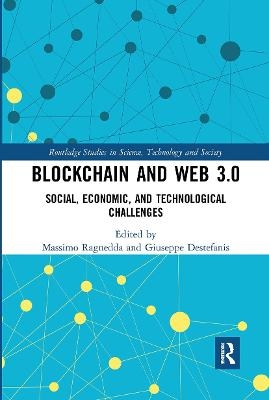
Blockchain and Web 3.0
Routledge (Verlag)
978-0-367-72692-8 (ISBN)
Blockchain and Web 3.0 fills the gap in our understanding of blockchain technologies by hosting a discussion of the new technologies in a variety of disciplinary settings. Indeed, this volume explains how such technologies are disruptive and comparatively examines the social, economic, technological and legal consequences of these disruptions. Such a comparative perspective has previously been underemphasized in the debate about blockchain, which has subsequently led to weaknesses in our understanding of decentralized technologies.
Underlining the risks and opportunities offered by the advent of blockchain technologies and the rise of Web 3.0, Blockchain and Web 3.0 will appeal to researchers and academics interested in fields such as sociology and social policy, cyberculture, new media and privacy and data protection.
Massimo Ragnedda is a senior lecturer in mass communication at Northumbria University, Newcastle, UK. Giuseppe Destefanis is a lecturer in the Department of Computer Science at Brunel University, UK.
Chapter 1. Blockchain: a disruptive technology. Massimo Ragnedda and Giuseppe Destefanis
PART I. Socio-economic aspects and consequences of decentralized technologies
Chapter 2. The block is hot: A commons-based approach to the development and deployment of blockchains, Sune Sandbeck, A.T. Kingsmith, Julian von Bargen,
Chapter 3. Can permissionless blockchains be regulated and resolve some of the problems of copyright law? Guido Noto La Diega and James Stacey
Chapter 4. Meetups: making space for women on the blockchain, Philippa R. Adams, Julie Frizzo-Barker, Betty B. Ackah, Peter A. Chow-White
Chapter 5. Drivers of Digital Trust in the Crypto Industry, Scott Freeman, Ivana Beveridge, Jannis Angelis
Chapter 6. Lightbulb Concrete. Bronwin Patrickson
PART II. Blockchain and Digital Media
Chapter 7. Could blockchain save journalism? An explorative study of blockchain’s potential to make journalism a more sustainable business. Walid Al-Saqaf and Malin Picha Edwardsson
Chapter 8. The logics of technology decentralization - the case of Distributed Ledger Technologies. Balazs Bodo and Alexandra Giannopoulou
Chapter 9. Disruptive Blockworks: blockchains and networks / acceleration and collision
Matthew Lovett
Chapter 10. Blockchained to What (End)? A Socio-material provocation to check distributed futures, Luke Heemsbergen, Alexia Maddox Robbie Fordyce
Chapter 11. Blockchain and data market. The case of Wibson from a critical perspective, Guillermina Yansen
PART III. Technological aspects and consequences of decentralized technologies
Chapter 12. Applying Smart Contracts in Online Dispute Resolutions on a Large Scale and its Regulatory Implications. Janet Hui Xue and Ralph Holz
Chapter 13. SmartAnvil: Open-Source. Tool Suite for Smart Contract Analysis. Stéphane Ducasse, Henrique Rocha, Santiago Bragagnolo and Marcus Denker
Chapter 14. Managing CRM with Fabric Hyperledger blockchain technology. Dario Puligheddu, Roberto Tonelli and Michele Marchesi
Chapter 15. Privacy with Ethereum Smart Contracts. Duarte Teles and Isabel Azevedo
Chapter 16. A Hierarchical Structure Model of Success Factors for (Blockchain-based) Crowdfunding, Felix Hartmann, Xiaofeng Wang and Maria Ilaria Lunesu
| Erscheinungsdatum | 06.04.2021 |
|---|---|
| Reihe/Serie | Routledge Studies in Science, Technology and Society |
| Verlagsort | London |
| Sprache | englisch |
| Maße | 156 x 234 mm |
| Gewicht | 616 g |
| Themenwelt | Mathematik / Informatik ► Informatik |
| Sozialwissenschaften ► Soziologie | |
| ISBN-10 | 0-367-72692-0 / 0367726920 |
| ISBN-13 | 978-0-367-72692-8 / 9780367726928 |
| Zustand | Neuware |
| Haben Sie eine Frage zum Produkt? |
aus dem Bereich


